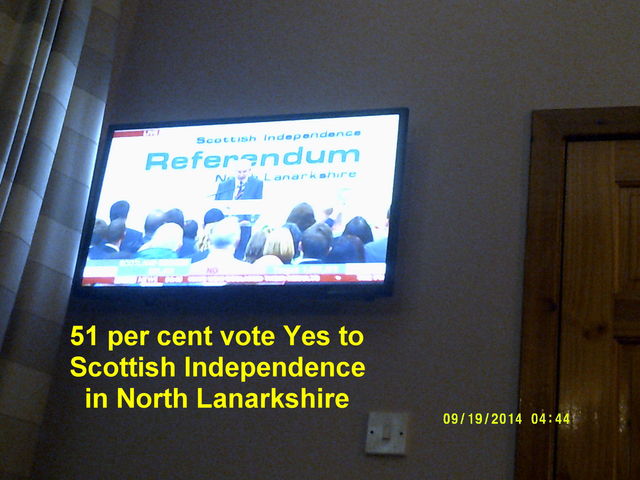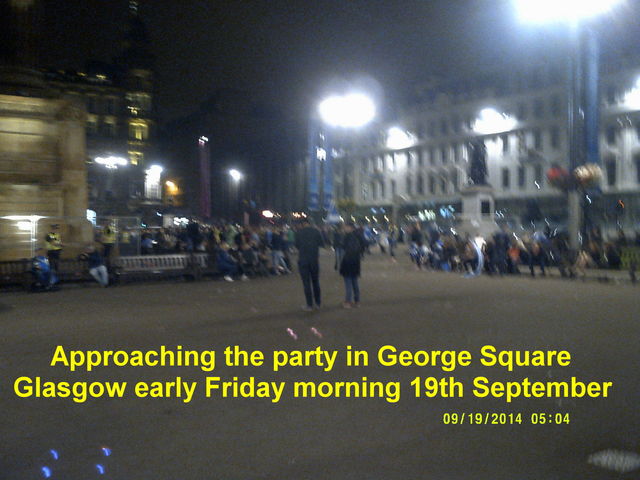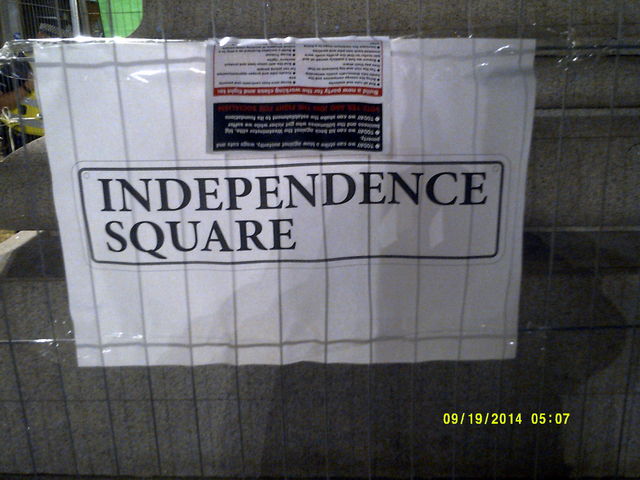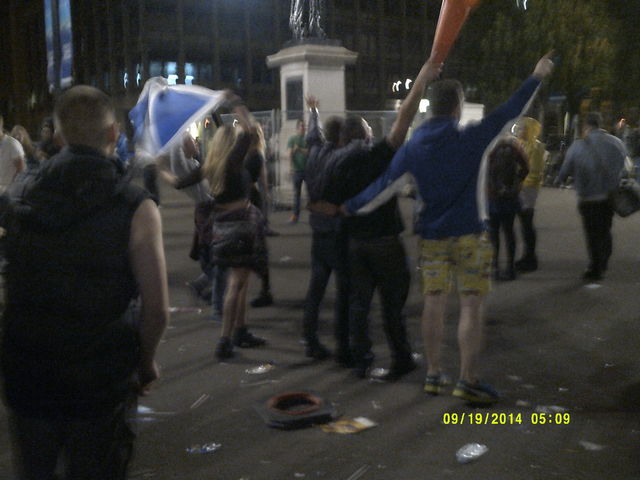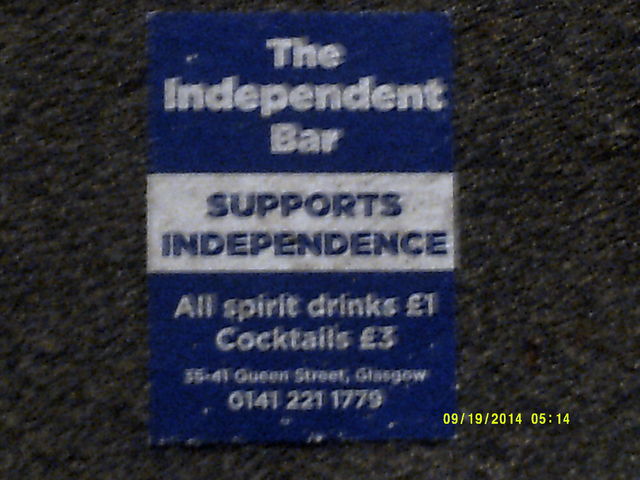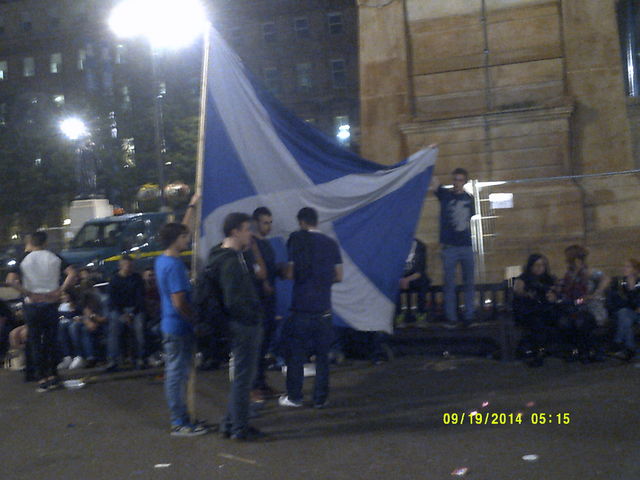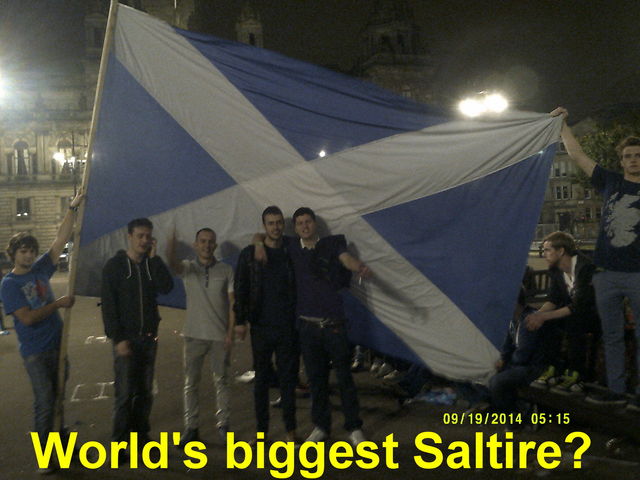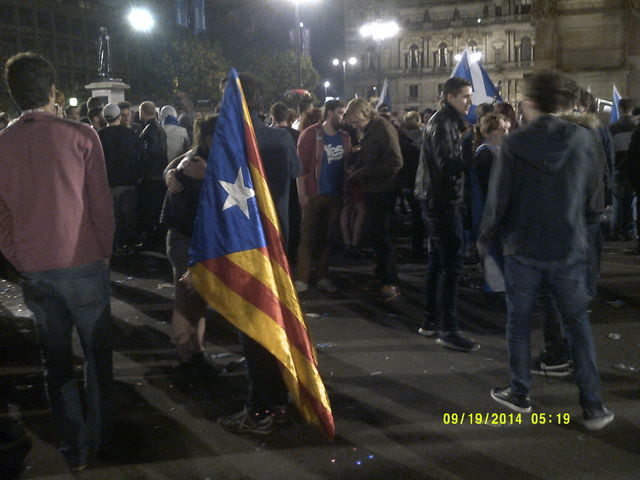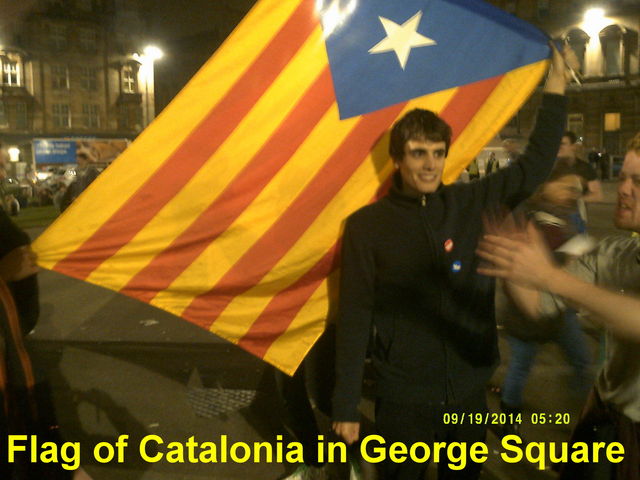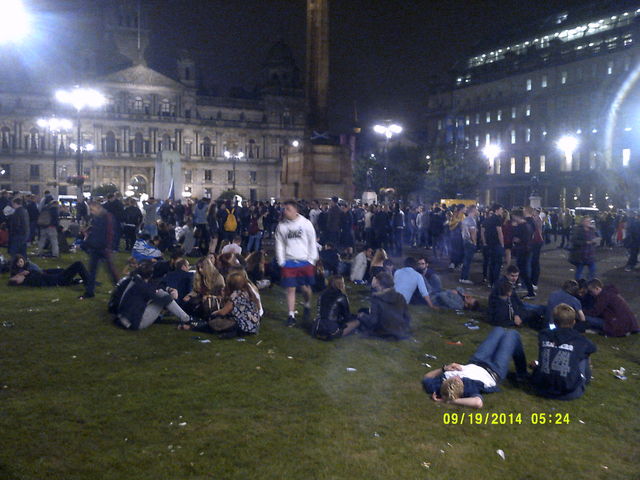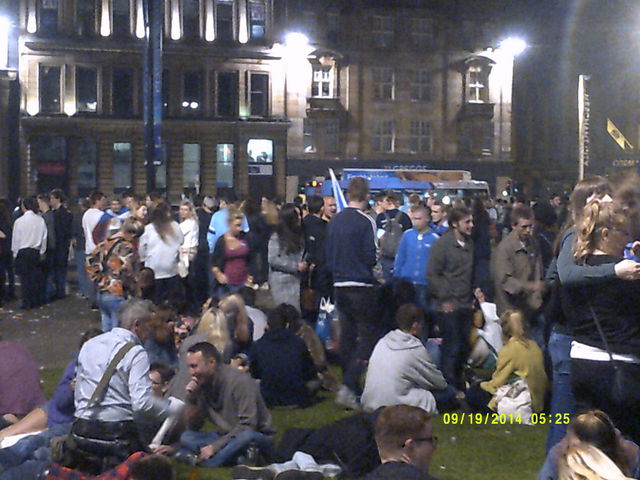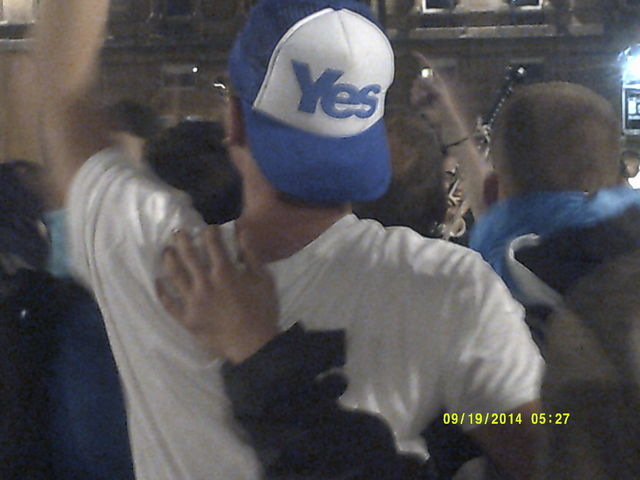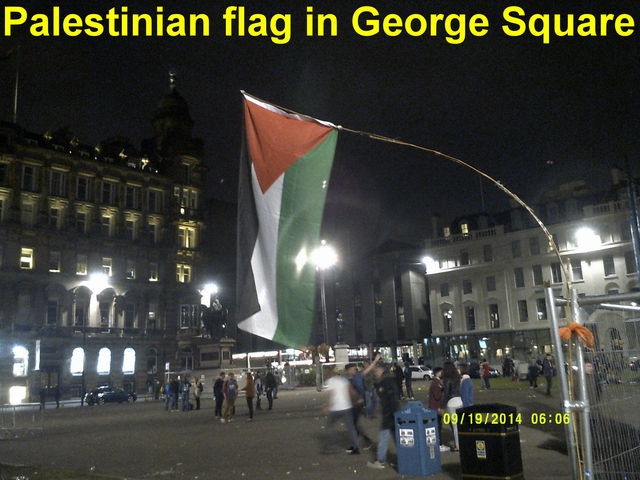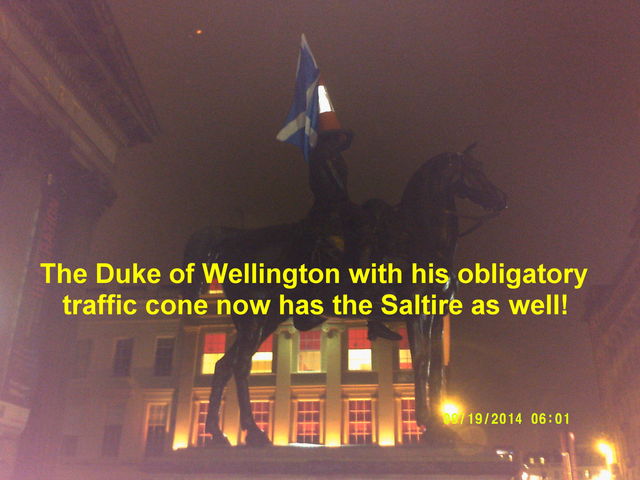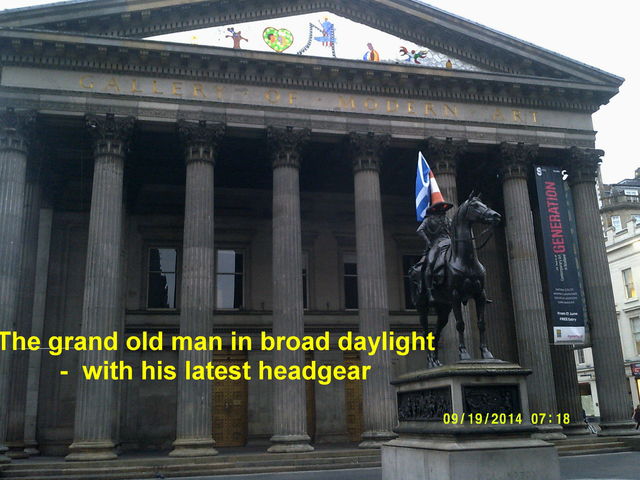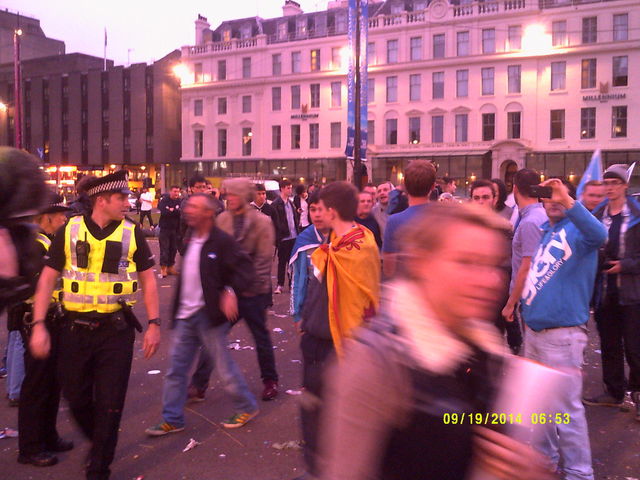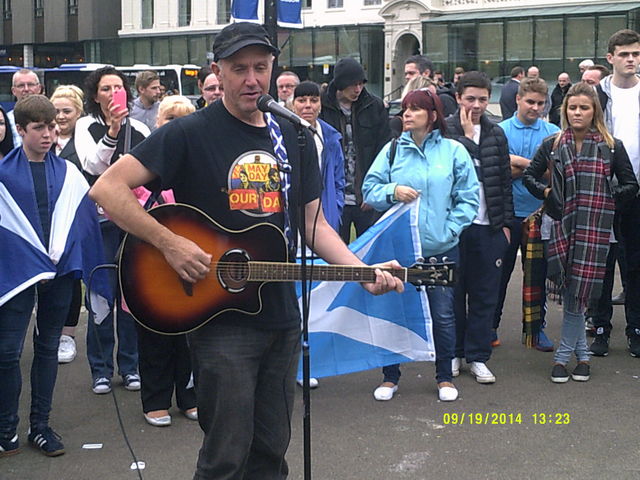Referendum night in George Square, Glasgow September 18/19 2014
Paul O'Hanlon | 21.09.2014 00:34 | Analysis | Anti-Nuclear | Culture | London | World
Thursday/Friday 18th and 19th September 2014
The long anticipated referendum on Scottish Independence took place on Thursday September 18th 2014. It had been in the making since 1979 and was widely seen, probably correctly, as the most important election in Scotland’s history. The most impressive feature of the day was the phenomenally high turnout which averaged nearly 85%. In the 1979 referendum on devolution, Scottish turnout was 63.6 per cent and in the same referendum in 1997, turnout was 60.2 per cent. The highest turnout in any Scotland-wide vote was in the 1950 UK general election when 80.9% voted to narrowly re-elect the Labour Government of Clement Atlee. However the turnout of 2014 was NOT quite as high as the 110% as shown on a CNN graphic which read 58% No and 52% Yes – a remarkable 110% attendance! This blooper went viral shortly afterwards with @StigAbell tweeting `Scottish voters have given it 110% according to CNN`.
The Yes camp held a party in George Square, central Glasgow which is home to the headquarters of Glasgow City Council, and boasts an important collection of statues and monuments, including those dedicated to Robert Burns, James Watt, Sir Robert Peel and the most visible which is a statue of Sir Walter Scott on a pillar. There was a feeling of excitement and anticipation in the Yes camp that a new era could be dawning and that history was in the making. Many hoped that the massive nuclear weapons complex at Faslane just 30 miles from Glasgow could be removed. Polls consistently show that around 75% of Scots don’t want these deadly weapons based on their soil at a huge cost of around £100 billion. Scottish First Minister Alex Salmond had said that if the vote was yes to Independence then the weapons would be removed from Scotland.
In the end it wasn’t to be and the massive misinformation campaign and scare tactics the Westminster Establishment used seemed to have bullied the `don’t knows` in to voting against Independence. First the banks threatened to flee an independent Scotland, then were was a story saying that the Loch Ness Monster had relocated south of the border! There were stories about food shortages and welfare cuts and military chiefs warned of consequences if Scotland voted the wrong way. In a letter in the Sun which is Britain’s biggest selling daily newspaper, 14 former armed forces chiefs said a No referendum vote was "critical for all our security". As reported on the BBC website: Breaking up Britain would "weaken us all", they added.
First Minister Alex Salmond cited military and naval figures who backed a "Yes" vote and said the letter's writers should "not try to use people's service for political reasons".
The letter was signed by seven former Chiefs of Defence Staff - Lords Boyce, Guthrie, Inge, Vincent, Stirrup, Craig and Richards.
Also putting their names to the letter were three former First Sea Lords - Lord West, Admiral Sir Mark Stanhope and Admiral Sir Jonathan Band; three ex-Army chiefs - Lord Dannatt, General Sir Mike Jackson and General Sir Roger Wheeler; and former head of the RAF, Air Chief Marshal Sir Richard Johns.
In an "open letter to the people of Scotland", they expressed concern about the possibility of a separate Scottish military.
"As former chiefs of the Royal Navy, British army and Royal Air Force, we know it is fiction to talk about regional armed forces," they wrote.
"We train as one, fight as one and are under one command. We are not, and have never been, structured for division."
They said a vote for separation would "undermine both Scotland and the rest of the United Kingdom's defence".
"At risk is the most successful alliance in history and one which has seen men and women from all parts of the country play their part in securing the liberties we now enjoy," they continued.
"This unity has guarded our borders and given us the space to prosper in a troubled world."
The letter concluded: "The division of the UK may or may not be politically or economically sensible, but in military terms we are clear: it will weaken us all."
Former British Prime Minister Tony Blair urged Scots to vote No as did his predecessor as PM Gordon Brown. US President Barack Obama, Hillary and Bill Clinton, Australian Prime Minster Tony Abbott and even Swedish Foreign Minister Carl Bildt all urged a No vote.
Carl Bildt said that he believed Scottish independence could have "profound implications" for the rest of Europe. Mr Bildt continued: "The Balkanisation of the British Isles is something we are not looking forward to. It opens up a lot, primarily in Scotland but also in the UK.
"What are the implications for the Irish question? What happens in Ulster?"
He said that he assumed the remainder of the UK would have to renegotiate the number of votes it holds in EU decision making.
And he warned the UK risked being seen as an "island adrift in the Atlantic" if it voted to leave the EU in an in-out referendum.
He said the EU would lose a "significant element of global clout" without the UK, but withdrawing from the EU would be an "even bigger disaster for the UK".
Mr Bildt, a member of the centre-right Moderate Party, is a former Swedish prime minister and was the UN's special envoy to the Balkans between 1999 and 2001.
'Constructive voice'
Responding to Mr Bildt's remarks, a spokesman for the Scottish government said: "These comments do not reflect the reality of Scotland's referendum process, which is a model of democracy and of how such processes should be conducted - and which has been cited as such internationally, including by the US Secretary of State.
"An independent Scotland will play our full part in the international community, bringing a peaceful, progressive and constructive voice to global affairs."
Scottish Conservative deputy leader Jackson Carlaw said: "Having held Scandinavia up as a beacon of hope, Alex Salmond must feel like a schoolboy who finds the sweetheart of his dreams has just revealed she doesn't find him attractive.
"No doubt this intervention will be dismissed by the Scottish government as Nordic scaremongering. But beyond the SNP's ego being bruised, this is yet another serious point being made by someone with no axe to grind."
The three London based political leaders Prime Minister David Cameron, Deputy Prime Minister Nick Clegg and Labour Party leader Ed Miliband all travelled north to Scotland to plead with Scots that they do not break away. In anticipation of a Yes vote they made a solemn declaration to give greater devolution to Scotland in the event of a No vote. This was called `The Vow` and was displayed on many newspaper front pages. It said among other things that the Scottish Parliament was permanent. The appeal made as the ‘Vow’ by Messrs Cameron, Miliband and Clegg of more powers for Scotland in return for a No vote sparked a Westminster rebellion less than 24 hours after it was given. It came as a growing number of Tory MPs at Westminster said they would fight tooth and nail to stop Scotland being given any more powers in the event of a No vote. One predicted there would be a “bloodbath” in the Tory party if more powers were given to Scotland.
There is also growing pressure for the Barnett Formula, the mechanism used to allocate funds to Scotland from the UK Treasury, to be scrapped in the event of a No vote - which would lead to a £4 billion cut to the Scottish budget.
Spain’s Foreign Minister Inigo Mende de Vigo said that an Independent Scotland would have to wait years to join the European Union. He also claimed during an interview on BBC’s Newsnight that a post-Yes Scotland would have to adopt the Euro if it was an EU member.
The Daily Telegraph newspaper which was strongly opposed to Scottish Independence reported that the Spanish Prime Minister had warned an Independent Scotland would have to apply from scratch for EU membership and the application process could take eight years.
Mariano Rajoy told the Spanish Parliament a yes vote for Scottish Independence would be a “torpedo to the vulnerabilities of the European Union”.
Mr Rajoy added that the EU was not created “to break up states, but to integrate them” but Mr Salmond insisted the Spanish would not block a Scottish application.
Thus it can be seen that very many powerful people were terrified at the thought of Scottish Independence and what it might mean. What precisely might it have meant we can wonder? Could it be that if a small country like Scotland ploughed its own furrow and looked after its own interests and disposed of its nuclear weapons then this might encourage other countries or regions in other countries to do likewise? Regions like Catalonia in Spain, Bavaria in Germany, The Basque Country in France and Spain, Quebec in Canada, California and/or Alaska in the USA and so on? Success by the small is sure to inspire others.
The lengthy list of those opposed to Scottish Independence includes Dr Henry Kissinger the great man of peace who was quoted in the Scotsman, Scotland’s national newspaper: `FORMER US secretary of state Henry Kissinger has said he would not welcome anything that would make the United Kingdom smaller.
Mr Kissinger, a former national security adviser and secretary of state under presidents Richard Nixon and Gerald Ford, said he has no strong views on the technical issues of the Scottish Independence referendum.
But he remains a strong advocate of Britain’s nuclear capability – which is based in Scotland – and its role in global strategy. “I have always been a strong advocate of the special relationship,” he told Prospect magazine.
“Not so much because of the power of Britain but because I thought it was important for America and important for the structure of the world to have another country that independently designed its policy but, because of its own convictions and a maybe different tradition of foreign policy and a longer experience with geopolitics, worked on common conclusions.”
Dr Kissinger had a long history of interfering in the internal affairs in many countries such as in Chile in 1973 when he helped overthrow the democratically elected regime of Salvador Allende and also the elected Australian Government of Gough Whitlam in 1975. He was jointly awarded the Nobel Peace Prize in 1973 with Vietnamese negotiator and former general and politician Lê Đức Thọ for their efforts in achieving the Paris Peace Accords which were meant to end the Vietnam War. Kissinger and his boss President Richard Nixon had overseen the saturation bombing of Indochina in the late 1960’s and early 1970’s. Lê Đức Thọ declined the peace prize as he felt peace had not really been achieved while singer-songwriter and satirist Tom Lehrer when asked to comment demurred saying only that satire was now obsolete.
Here is how Dr Kissinger may have seen the referendum.
(Please note that this is satire and I certainly do not condone Dr K’s foreign policies when he was US Secretary of State and right hand man to Presidents Richard Nixon and Gerald Ford. I make no comment on his penchant for dating fascinating females. As to his Nobel Peace Prize award in 1973 well I think Lehrer put it rather well with his remark that satire was now out-of-date.)
 http://www.indymedia.org.uk/en/regions/world/2014/09/518187.html
http://www.indymedia.org.uk/en/regions/world/2014/09/518187.html Both BBC and ITV’s all night election programmes were called `Scotland Decides` as was the BBC Radio 4 coverage. There were suggestions that a Yes vote could cost jobs at the BBC and Scottish viewers would not be able to watch `EastEnders` or `Dr Who`. Here is a clip from a `Referendum Tonight` broadcast on Wednesday 20th August 2014 `What would a Yes vote mean for the BBC? `
 http://www.bbc.co.uk/programmes/p0256htl
http://www.bbc.co.uk/programmes/p0256htl After the polls closed at 2200 on Thursday evening the first region to declare was Clackmannanshire at about 1.30 on Friday morning. The signs weren’t great for the Yes people as the `Wee County` voted 54-46 against Independence. After that, Orkney, Shetland, the Western Isles, Inverclyde, Renfrewshire, Midlothian, East Lothian, Stirling, Falkirk, Angus, Dumfries & Galloway, East Renfrewshire, Aberdeen, East Dunbartonshire, South Lanarkshire, Perth & Kinross, West Lothian, Scottish Borders, North Ayrshire, South Ayrshire, East Ayrshire, Aberdeenshire, Edinburgh, Argyll & Bute, Fife and Moray and Highland in that order, all voted "No" to Independence.
The Yes camp did have some notable wins such as in Scotland’s fourth city Dundee and in the counties of North Lanarkshire and West Dunbartonshire. Their biggest triumph of the night was when Scotland’s largest city Glasgow voted in favour of Independence. Unfortunately that wasn’t enough and the final count was 2,001,926 No and 1,617,989 Yes on a turnout of 85% of the 4.29 million registered voters. This makes it the largest electorate in Scottish voting history.
As region after region declared for the No vote the inevitable happened when Fife’s declaration at 8 minutes past six in the morning meant that Scotland had officially rejected Independence.
After the initial high hopes the aftermath was a rather flat and subdued atmosphere in George Square after the result became known shortly after 6 am.
On voting day Thursday 18th the `Independent` newspaper had lead with `Scotland writes history` while Rupert Murdoch’s `Sun` equated Prince Harry’s secret date with former lover Cressida Bonas with the referendum decision as `Better Together` and an `exclusive` poll showed the No’s ahead by a `nose`. The (Glasgow) Evening Times showed four people counting ballots with a headline above `Record Turnout For Independence Vote` and underneath the phot was `Our Nation Learns Fate`. The Edinburgh Evening News had a full two page front cover panorama of Holyrood with two small children sitting on a hill looking down on the Scottish Parliament with their arms around each other headlined `Their future. In your hands. ` There was a quotation from philosopher David Hume (1711-1776) “It’s when we start working together that the real healing takes place…it’s when we start spilling our sweat, and not our blood.” Inside there a piece on how tennis star Andy Murray had posted a message on Twitter declaring his support for a Yes vote. He is not eligible to vote however as he not currently resident in Scotland.
In another part of the country which I happened to visit at the time of the NATO summit in Newport, South Wales the Penarth Times of Thursday September 11th 2014 had an item about a local singer-songwriter called Adrian Roper who had recorded a song `Freedom’s Hame` (Freedom’s Home) in support of a Yes vote at the Scottish referendum. He planned to travel up to Scotland to perform it. In the same paper the local MP Stephen Doughty (Labour, Cardiff South and Penarth) wrote in his column how he had also travelled up to Scotland to make the case for `better together`. It can be seen that the whole issue of an Independent Scotland made news far and wide.
The I on Saturday (abridged version of The Independent) of Saturday 20th September was headlined `The Union strikes back` while the Edinburgh Evening News of that day was headlined `BYE ECK` referring to Scottish First Minister Alex Salmond’s resignation with a photo of Mr Salmond applauding his deputy Nicola Sturgeon who the paper informs us is likely to succeed him unopposed.
Russia Today of Saturday 20th September saw the referendum discussed on the Keiser Report with Max Keisers’s wife and co-presenter Stacy Herbert commenting that the Yes voters were motivated by optimism and hope while the No voters were motivated by fear.
The gathering in George Square on Friday morning thinned out slowly with many clearly upset at the outcome but later that day there was a revival of the crowd with a number of speakers including Glasgow anti-poverty campaigners Darren and Andy Carnegie. They addressed those assembled and passed the microphone around for anyone who wanted to comment. One member of the crowd said that the vast amount of money spent on Faslane – estimated at about £100 billion would pay for around one million new housing units at a cost of say £100,000 each. There are an estimated 135,000 people on Glasgow’s social housing waiting lists and a million new houses and flats would mean every homeless person in Glasgow could have seven houses – precisely the number Tony Blair has!
Andy and Darren led with sing-songs and line dancing and humorous stories while Glasgow singer Alan Smart sang anti-war songs.
Sadly after all that there was some trouble in the Square later on that day when Unionist supporters threw flares and charged at the Yes campaigners. It was reported on the BBC Scotland website that there were 11 arrests:
 http://www.bbc.co.uk/news/uk-scotland-glasgow-west-29294562
http://www.bbc.co.uk/news/uk-scotland-glasgow-west-29294562 Well it’s all over and now the reflections can begin. Was it all worth it? Where do we go from here? Will there be another referendum in our lifetime? Will there be a recount of this year’s votes?
There are lots of questions and time will provide some of the answers. One thing for certain is that it was a very animated affair with so much engagement between communities in contrast to the apathy and extremely poor turnouts at Council and Euro elections when sometimes only a quarter of people bother to vote if they even know about it in the first place. We may not see another referendum in our lifetimes but the one in 2014 will live long in the memory, I think we would all wish Alex Salmond, an honourable and humane man a happy retirement. Maybe the result was not to everyone’s liking and maybe there was too much interference not just from the British Establishment but from a whole cacophony of sources including the US President, Australian and Spanish Prime Ministers, the Swedish Foreign Minister, media barons, military men and even the former US Secretary of State Henry Kissinger. That list though extensive is by no means exhaustive. We could add the Canadian Prime Minster Stephen Harper who voiced strong opposition to Scottish Independence and praised the UK as an “overwhelmingly positive force in the world”.
The Scottish electorate was screamed at from every angle to vote No. Under the circumstances for anyone to get 45% of the vote is quite an achievement so there is no need for those who aspired to a Self-governing Scotland to feel downhearted.
Whatever the result long live Scotland the Brave!
Paul O'Hanlon
 e-mail:
o_hanlon@hotmail.com
e-mail:
o_hanlon@hotmail.com
